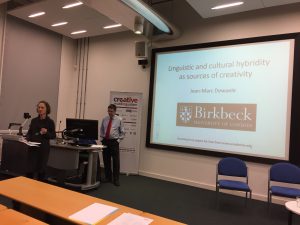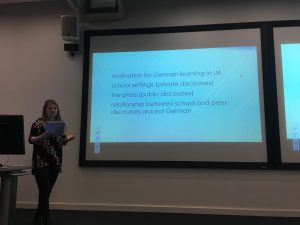Our identities are shaped in highly individual ways – and if you have more than one language, probably even more so! Academics, teachers, students, artists, poets and other interested parties came together on 2/3 February 2018 at Reading University’s Institute of Education (IoE) to exchange ideas on creative multilingual identities. The IoE’s very own Professor Suzanne Graham strand leader for the Creative Language Learning section of the large-scale AHRC-funded Creative Multilingualism programme which the conference was part of, welcomed delegates to the first day. Suzanne introduced some splendidly varied presentations by early career researchers on topics such as translation, translanguaging (yes that’s a word,) language learning, and bilingual poetry and art. I flew the flag for the IoE with some examples of my research on how teenage German learners use metaphors – see what I did there??

Professor Suzanne Graham introduces key note speaker Professor Jean-Marc Dewaele (Birkbeck, University of London) at the IoE-hosted Creative Multilingual Identities conference
A lively panel and audience then debated whether Modern Languages in the UK needs a new identity. No easy answers, but plenty of thought-provoking questions to think about.
On the second day, we heard about nature’s many languages, and how linguistic and biological diversity complement each other perfectly in the area of conservation. Professor Jean-Marc Dewaele gave a highly entertaining and enlightening talk about diversity, linguistic and otherwise: culture cannot exist without it. Society needs people who don’t fit into the usual pattern.
There was not a dry eye in the house when Amerah Saleh and Bohdan Piasecki, ‘Free Radicals’ from the Beatfreeks Collective moved the audience to tears for all the right reasons with their multilingual poetry in Arabic, Polish and English. Powerful stuff.
Next up were two hands-on workshops, which were also joined by many local teachers. Dr Anna Wolleb from Reading University’s Centre of Literacy and Multilingualism helped delegates to explore the roles different languages have on the lives of multilingual speakers, and Carey Mayzes from the Association for Language Learning got participants to try out a new language as part of her talk on Language Futures, an initiative for primary and secondary schools to develop languages beyond the classroom.
Then Rinkoo Barpaga , an amazing storyteller and comedian, took the stage and had us all enthralled. Rinkoo is deaf and used sign language and an interpreter to communicate with the audience.
Finally, Professor Terry Lamb chaired a panel on community languages in schools. A lot of good work goes on here already which sadly does not receive much publicity, but it’s crucial that teacher education should support multilingual classrooms in the UK.
An inspiring two days passed by in a multilingual flash, but the ideas and connections made will stay with us for a long time. If you’d like to follow up on conference contributions, have a look on the Creative Multilingualism conference page .
Heike Krüsemann is a recent IoE PhD student and current post-doctoral researcherClick here for Heike’s PhD blog

Heike Krüsemann on her PhD research (supervised by Professor Suzanne Graham, IoE) on adolescents’ motivation for language learning
